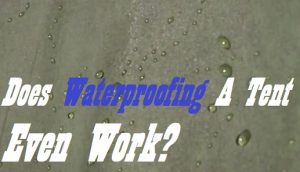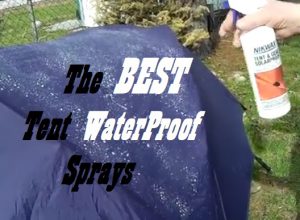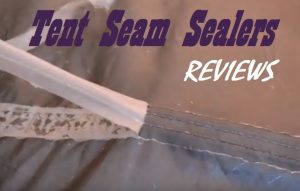 I was enjoying campfire activities with neighboring campers a few weeks ago and we were sharing our camping experiences. These guy were relatively new campers and we eventually got onto the subject of tents. Sure enough the next question was ‘Does waterproofing spray actually work on tents?’.
I was enjoying campfire activities with neighboring campers a few weeks ago and we were sharing our camping experiences. These guy were relatively new campers and we eventually got onto the subject of tents. Sure enough the next question was ‘Does waterproofing spray actually work on tents?’.
When they hit me up with this question, I was a little taken back as if to say “of course they work”.
But no when I think about it, I can see where they were coming from. With so many product scams or marketing scams if you will, how were they to know if these sprays actually do what they are suppose to. So this article is for you Aaron and Renae.
How Does Waterproof Spray Work On Tents?
The first thing you need to do is check whether your tent is already waterproofed, or not. Not all brand new tents come waterproofed. This includes the rainfly. So don’t assume your tent is water proof as it may not be. Test this by pouring some water onto the rainfly/tent and if it runs off completely and doesn’t leave any water absorption marks then it’s waterproofed.
So if you know that your tent needs some waterproofing done, you have to decide on what products to use and how far are you going to take it.
When waterproofing your tent, you need to consider sealing the seams of your tent and the nylon material on the tent and also the rainfly. To do this you need 2 different products. A seam sealer and a waterproof spray.
Waterproofing The Actual Tent
When waterproofing your tent, the two common products are either water based or silicon based. These are the best waterproof sprays for tents to use if you want a quality job that lasts years instead of months.
With the water based products it’s best to spray on the tent when it is slightly wet. Rubbing down with a wet sponge is sufficient. For the silicon based sprays its best to apply when the tent is dry. I like to carry a can of water based with me when I go camping so if I spring a leak I can spray it while it’s wet.
Some folks recommend spraying just the rainfly with waterproof. This is fine and dandy if your rainfly is high quality and is designed well. Me personally I have no problems in spending just a few bucks for an extra tin to spray the actual tent as well.
The Most Important Part Of Waterproofing A Tent
More often than not, folks will buy a can or two of high quality waterproofing spray. Take it home and blast there rainfly and maybe the tent with it. Sadly they think the job is done then.
First of all I recommend applying two coats of waterproof for the best results. As this spray seeps into the tent material, adding another coat on top allows you to have a good solid waterproof coating on top.
But the most important thing you can do to ensure you have a dry camping trip is to seal the seams of the tent. This step is often forgotten and the reason for so many ‘wet camping trips’.
By using only the best seam sealers you can gurantee yourself a tent that won’t leak at the common leak areas like the seams around windows and joints in the tent.
A seam sealer works by applying a thick rubber like paste over the seams of you tent. This is where the stitches are and have thousands of tiny holes for water to protrude into. So by blocking these holes up, water won’t gather on the inside of your tent around the seam areas. Waterproof spray is not ideal for the seams as it is not as good for getting into these little stitches. So I highly recommend you use a seam sealer as well as a waterproof spay to complete the perfect waterproof tent.
Need Proof That Waterproof Sprays Actually Work On Tents?
So all is well and good for me to tell you that waterproofing a tent with spray on products works 100% if you do it right and use the right products. But seeing some actual proof is where it is at.
In these two videos below you can see first hand the evidence the difference between using waterproof spray and not having it on your tent. This is a really good example becasue you can see the water repels off the tent when it is waterproofed, but soaks into the rainfly on the not waterproofed side. When the water soaks in like this it eventually seeps onto your tents outer lining. Then eventually into the inside walls of your tent and down the seams.
The second video will explain how if you waterproof your tent properly you can get a few good years out of your tent before having to do it again. Plus you get to see how easy it is to apply a tent seam sealer.
